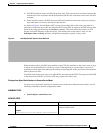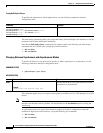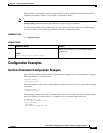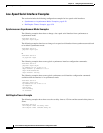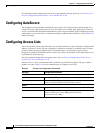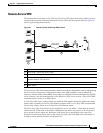
9-4
Cisco 819 Series Integrated Services Routers Software Configuration Guide
OL-23590-02
Chapter 9 Configuring Security Features
Configuring Cisco IOS IPS
Configuring Cisco IOS IPS
Cisco IOS Intrusion Prevention System (IPS) technology is available on Cisco 819 ISRs and enhances
perimeter firewall protection by taking appropriate action on packets and flows that violate the security
policy or represent malicious network activity.
Cisco IOS IPS identifies attacks using “signatures” to detect patterns of misuse in network traffic.
Cisco
IOS IPS acts as an in-line intrusion detection sensor, watching packets and sessions as they flow
through the router, scanning each to match known IPS signatures. When Cisco
IOS IPS detects
suspicious activity, it responds before network security can be compromised, it logs the event, and,
depending on configuration, it does one of the following:
• Sends an alarm
• Drops suspicious packets
• Resets the connection
• Denies traffic from the source IP address of the attacker for a specified amount of time
• Denies traffic on the connection for which the signature was seen for a specified amount of time
For additional information about configuring Cisco IOS IPS, see Securing the Data Plane Configuration
Guide Library, Cisco IOS Release 12.4.
URL Filtering
Cisco 819 ISRs provide category based URL filtering. The user provisions URL filtering on the ISR by
selecting categories of websites to be permitted or blocked. An external server, maintained by a third
party, will be used to check for URLs in each category. Permit and deny policies are maintained on the
ISR. The service is subscription based, and the URLs in each category are maintained by the third-party
vendor.
For additional information about configuring URL filtering, see Subscription-based Cisco IOS Content
Filtering.
Configuring VPN
A virtual private network (VPN) connection provides a secure connection between two networks over a
public network such as the Internet. Cisco 819 ISRs support two types of VPNs-site-to-site and remote
access. Site-to-site VPNs are used to connect branch offices to corporate offices, for example. Remote
access VPNs are used by remote clients to log in to a corporate network. Two examples are given in this
section: remote access VPN and site-to-site VPN.
• Remote Access VPN, page 9-5
• Site-to-Site VPN, page 9-6
• Configuration Examples, page 9-7
• Configure a VPN over an IPSec Tunnel, page 9-7
• Create a Cisco Easy VPN Remote Configuration, page 9-15
• Configure a Site-to-Site GRE Tunnel, page 9-17




